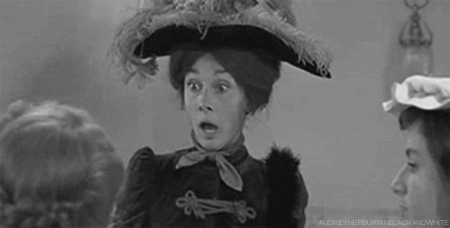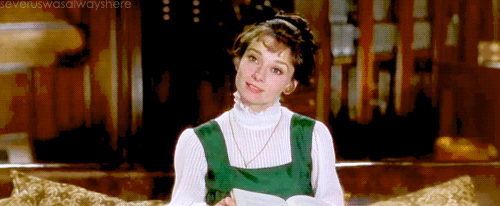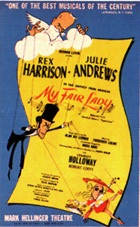During my last community theatre stint (How To Succeed…), I recall sitting around the green room (as I often do), chatting it up with my fellow thespians. We would make suggestions for what shows our theatre should put on next season. Among the myriad show titles that got tossed around, I heard some that disturbed me greatly: My Fair Lady, Oliver, and Evita.
 |
| Eeeeew! |
To me, the very names of those particular shows resemble the sound of nails on a chalkboard. It’s like someone telling you their favorite movie is Live and Let Die. Of all the movies in the world, you’re gonna pick that? I’m not saying it’s a horrible movie (great opening song!), but in the vast wealth of all the wonderful, substantial, engaging films in the world ever made, you seriously deem that as your favorite?
Don’t get me wrong; each of these musicals do have at least one really kickass number and relatively interesting subject matter. But I just do not understand the volume of their mass appeal and popularity! The very best musicals tend to have a good story/theme/message AND good music. In my opinion, these shows seem to lack one or both of those things. But these shows have won numerous awards and rave reviews, so is it me? This will be the first of a short series of posts questioning the overall charm of shows I simply can’t stand (and you’re in luck, cuz there aren’t that many of them).
Based on: George Bernard Shaw’s play, Pygmalion (which was further based on the mythical ancient Greek sculptor of the same name who created a female statue that eventually came to life)
Music: Frederick Lowe
Book & Lyrics: Alan Jay Lerner
Broadway Debut: 1956
My Fair Lady has been called “the perfect musical.” WHY???? Now in all fairness, I’ve only seen the first act of the musical live at the Media Theatre (we left at intermission because we were bored to the point of expiration) and the film version (seriously, Warner Brothers? Audrey Hepburn???). So maybe there was something golden I missed in the second act of the live performance version that would have changed my view… doubtful. And I’m not saying it’s a bad musical. I just don’t think it’s that great. Does it have great songs? Hells yes! Does it have a great plot? Meh.
The story pretty much boils down to:
Boy meets GirlGirl can’t speak “proper English,” so Boy teaches her how on a bet with his buddyBoy treats Girl like crap and she eventually articulates weather patterns in Europe.Girl gets tired of Boy’s Grade-A B.S. and ditches himBoy kinda-sorta realizes he misses having Girl aroundGirl comes back and fetches Boy’s slippers * The roles of Boy and Girl were played by Prof. Henry Higgins and Miss Eliza Doolittle, respectively.
With the song “Ascot Gavotte” coming in a close second, my biggest problem with this show is the lack (or total dismissal) of revelation at the end. On both characters’ ends. We’ll start with Enry Iggins. Henry Higgins’ only glimmer of awakening is that he’s gotten used to having Eliza around. Not that he loves her or misses her; he’s just grown accustomed to her being there. He admits this with about as much warmth as if he’d lost his iPod. It really helps to get me going when I go jogging every morning! Does he even have a clue of what he did wrong? Why she left him? I realize he doesn’t get women (hell, I am one and I still don’t get them!), but he’d have to have Asperger’s or something not to realize he’s being a total A-hole to Eliza. Am I to assume that as soon as the woman he saw as nothing more than a service parrot walks out on him, he suddenly grows a conscience and a soul and finds he’s got feelings for her? Um, no.
And shame on Eliza too! She comes to the much more meaningful realization that no matter how she dresses or speaks, she is a human being and deserves to be treated like one. More than that, she realizes she has the power to walk away from her self-important “creator” and be her own person. She successfully escapes class and gender oppression; not an easy feat in Edwardian London!
 …….. And then she goes back to his misogynistic ass half an hour later. I’m not trying to slather feminism onto this crap sandwich or anything. I just don’t get what brought her back. And frankly, neither did George Bernard Shaw. He staunchly disapproved of any production in which Eliza and Higgins end up together. In Pygmalion, she walks away and stays away. Now I don’t really care if she goes back to him in the musical. I get it; musicals need to have a happy ending (at least they did in 1956). But if she’s gonna go back to have a relationship with him, I need a good reason! She knows he hasn’t earned and doesn’t deserve her love, but she gives it to him anyway. All Eliza wanted from her mentor was respect and friendship. She never expressed love for him and vice versa. Was love just supposed to be implied? Well, I sure didn’t pick that up. At some point, I’m pretty sure that Lerner and Lowe must have said said, “Ah, fuck it. We’ll just wrap it up with an impromptu romance in the last 30 seconds. Yeah, that works!” It’s a musical, for Pete’s sake! There’s supposed to be love seeping out of every note! Don’t assume I know you’re in love if all you do for 2½ hours is learn how to stop dropping H’s. And if he’s not really in love with her, even worse! She comes back to… what? Just be there out of convenience? Not cool, Eliza. Not cool.
…….. And then she goes back to his misogynistic ass half an hour later. I’m not trying to slather feminism onto this crap sandwich or anything. I just don’t get what brought her back. And frankly, neither did George Bernard Shaw. He staunchly disapproved of any production in which Eliza and Higgins end up together. In Pygmalion, she walks away and stays away. Now I don’t really care if she goes back to him in the musical. I get it; musicals need to have a happy ending (at least they did in 1956). But if she’s gonna go back to have a relationship with him, I need a good reason! She knows he hasn’t earned and doesn’t deserve her love, but she gives it to him anyway. All Eliza wanted from her mentor was respect and friendship. She never expressed love for him and vice versa. Was love just supposed to be implied? Well, I sure didn’t pick that up. At some point, I’m pretty sure that Lerner and Lowe must have said said, “Ah, fuck it. We’ll just wrap it up with an impromptu romance in the last 30 seconds. Yeah, that works!” It’s a musical, for Pete’s sake! There’s supposed to be love seeping out of every note! Don’t assume I know you’re in love if all you do for 2½ hours is learn how to stop dropping H’s. And if he’s not really in love with her, even worse! She comes back to… what? Just be there out of convenience? Not cool, Eliza. Not cool.
So how ‘bout it? What am I missing that makes this the “perfect musical” and not just an “okay” musical? It’s definitely got some wonderful, timeless songs, but so does Cats (I guess… which reminds us that “Entertaining” does not = “Good”). I want to understand the appeal. So please, try and sway me. I'm listening…

Fun Fact: Rex Harrison's microphone (hidden in his neckties) would occasionally pick up police broadcasts from passing police cars. "Damn, damn, damn, damn! I've grown accustomed to her- Code purple! 10-72!


I believe that you have nailed MFL to the wall, conclusively, compellingly, resolutely, and factually. MFL story line is a real head-scratcher and deserves to be peeled like the smelly onion it is. I guess sometimes we curious human beings like things (smoking, video games, chocolate-covered ants) that seem to make little sense. What a bunch of chuckleheads we are!
ReplyDelete